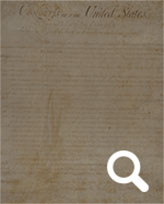Declaration of War: The U.S. Enters World War I
Declaration of War: The U.S. Enters World War I
On April 6, 1917, President Woodrow Wilson signed this joint resolution, ending America’s neutral stance on the ongoing global conflict – later deemed a “World War” – and formally declaring war against Imperial German Government.
Nearly three years earlier, Archduke Franz Ferdinand of Austria had been assassinated by a Serbian nationalist in Sarajevo on June 28, 1914. This triggered a series of conflicts that conflated into war across the European continent. The United States, however, sought to remain neutral through a policy of nonintervention.
In early 1917, that policy became unfeasible when Germany began attacking American ships, but President Wilson, who had campaigned on a platform of peace, remained hesitant to enter the fray. The final straw came when Great Britain shared the intercepted Zimmermann Telegram with the United States, revealing that Germany had promised American territory to Mexico in return for attacking the U.S. if it entered the war.
On April 2, 1917, President Woodrow Wilson made a special address before a joint session of Congress asking for a declaration of war against Germany. Both the Senate and the House of Representatives overwhelmingly voted in favor of going to war, and on April 6 President Wilson signed this formal war declaration, stating “that a state of war exists between the Imperial German Government and the Government and the people of the United States.”
In commemoration of the 100th anniversary of U.S. entry into World War I, this document was on display in the “Featured Documents” exhibit in the East Rotunda Gallery of the National Archives in Washington, DC, from April 4 through May 3, 2017.
The National Archives Museum’s “Featured Document” exhibit is made possible in part by the National Archives Foundation through the generous support of Ford Motor Company Fund.
Past Featured Records
-
The Emancipation Proclamation and Juneteenth
Milestones in the long struggle for American freedom
Emancipation Proclamation
President Abraham Lincoln issued the Emancipation Proclamation on January 1, 1863, as the nation approached the third year of the Civil War. Lincoln’s proclamation, which declared “that all persons held as slaves” within the rebellious states “are, and... Read more
-
Harvey Milk Writes to the President
Friday, May 31, 2024 – Monday, June 17, 2024
East Rotunda GalleryHuman Rights at the Ballot Box
In 1978, Californians voted on Proposition 6, which would have banned gay men and lesbians from teaching or otherwise being employed by California school districts. The initiative sponsored by... Read more -
Memorial Day: Honoring the Fallen
Thursday, May 16, 2024 – Wednesday, June 12, 2024
East Rotunda GalleryMemorial Day recognizes and honors the U.S. military personnel who died while serving in the Armed Forces. The first national observance of Memorial Day occurred on May 30, 1868, at Arlington National Cemetery. General John... Read more
-
The Purple Heart Battalion
Tuesday, April 16, 2024 – Wednesday, May 15, 2024
East Rotunda GalleryThe 442nd Regimental Combat Team
None of us thought we were coming home alive. —Lawson Sakai
Following Japan’s attack on Pearl Harbor in 1941, the Roosevelt administration required people of Japanese descent living on the... Read more
Frances Perkins: Champion of Workers’ Rights
Thursday, February 29, 2024 – Monday, April 15, 2024
East Rotunda Gallery“I came to Washington to work for God, FDR, and the millions of forgotten plain common workingmen.” —Frances Perkins
Chances are you benefit from the legacy of Frances Perkins,... Read more








